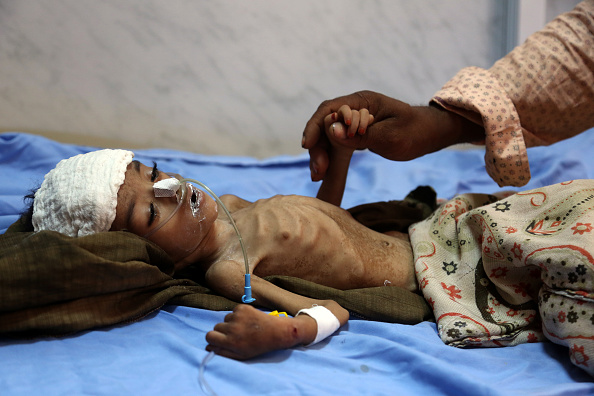The resumption of the Saudi-led air strike campaign on Yemeni‘s main port city of Hodeidah could create ideal conditions for a catastrophic new cholera outbreak that could affect thousands of people, the international non-profit organization Save the Children has warned.

On Friday, Saudi Arabia and other Western-backed Sunni Arab states launched heavy air strikes on Hodeidah, bringing to an end a nearly month-long hiatus which the United Nations hoped would aid efforts at a political solution to the conflict, which has pitted the pro-regime coalition against Houthi rebels aligned with Iran.
READ MORE: Saudi-led coalition conducts airstrikes on Yemen’s crucial Hodeidah airport
An estimated 350,000 people remain in Hodeidah, where Save the Children says already-paltry clean water facilities have been further decimated by the Saudi-led offensive in the region, which began in June.
Now, the resumption of the bombing campaign — coupled with the arrival of summer— could make Hodeidah “ground zero” for a fresh cholera outbreak, according to Helle Thorning-Schmidt, CEO of Save the Children International.
“Cholera could spread like wildfire in Yemen, potentially infecting thousands of children and completely overwhelming an already crippled health system,” said Thorning-Schmidt after a recent visit to Yemen. “Many hospitals have been reduced to rubble, and those that are still standing are barely functioning.”
WATCH: Saudi-led coalition keeps up Hodeidah assault before UN meeting

A bacterial disease caused by consuming contaminated water and food, cholera can induce severe watery diarrhea and dehydration leading to death, according to the World Health Organization (WHO). The disease spreads rapidly in places that lack adequate water-treatment facilities.
Around a million Yemenis contracted cholera between 2016 and 2017, according to the International Committee of the Red Cross. Over 2,000 died including many children, according to the WHO, in what was the worst cholera epidemic in modern history.

With Hodeidah residents now forced to contend with both the oppressive heat of the summer months as well as the considerable firepower of the Saudi-led coalition, doctors say they are “terrified” at the prospect of a cholera epidemic worse than last year’s.
“We’re terrified of another outbreak as the number of cholera cases is increasing day-by-day,” said Dr. Mariam Aldogani, a Save the Children doctor based in Hodeidah. “Just six weeks ago we were going to close many of our cholera treatment centres, but owing to the surge of cases, we have to keep them open.
“Water chlorination isn’t a durable solution, the summer heat is relentless, there’s rubbish lining the streets and the health system is bursting at the seams.”
READ MORE: Mothers in Yemen skip meals, battle gnawing stomachs to feed children — but it’s not enough
Malnourished children are particularly vulnerable to contracting cholera.
Forty per cent of Yemeni children under the age of five are now acutely malnourished, according to the United Nations World Food Programme.

The three-year war has killed more than 10,000 people, with the Saudi-led coalition accused by rights groups of indiscriminate bombing of civilian areas, a charge it has denied.
READ MORE: Saudi Arabia is destroying Yemen, should fund ‘100%’ of humanitarian aid, says UN official
“Three years of war have created the worst humanitarian crisis in the world, and the tragedy of Yemen is that this crisis is entirely man-made. Children’s suffering is the direct result of the tactics and actions of all parties to the conflict, and it can end,” said Thorning-Schmidt.
“All sides must allow aid agencies like ours to have full, unimpeded humanitarian access to save lives. The international community must also step up its support for health and sanitation so that we can prevent another outbreak of this merciless disease.”
— With files from Reuters




Comments